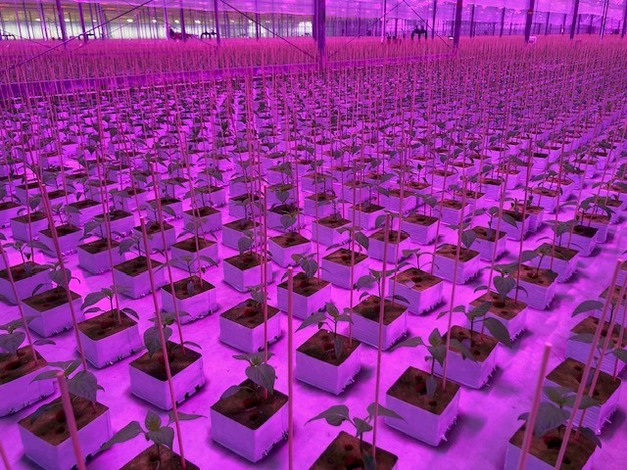With the addition of a new greenhouse last year, the nursery Globe Plant has already doubled its cultivation area from 4.5 to nearly 8 greenhouse hectares, but even that proved not enough to meet the growing demand. "There is still a high demand for additional square meters," said Vera Grootscholten. That's why the company has rented additional greenhouses again this year. It's quite a challenge because even though energy prices have fallen, efficiency remains very important in the cultivation sector, as well.
Globe Plant's greenhouse in Vierpolders is currently more than well-filled with young cucumber and tomato plants, and the new greenhouse in Brielle is full of young bell pepper plants. These will find their way to buyers in the Netherlands, Germany & Switzerland in the coming weeks. While last year's growing season went differently than normal due to the energy crisis, this year, a number of customers are back to ordering as they used to. "Not everything has gone back to normal yet, but a lot has," he said.
Lighting
The energy crisis also affected the plant nursery itself. When ordering the lighting installation for the greenhouse in Brielle, the team still opted for partly SON-T and partly LED. "That installation had just been completed when the energy crisis came. If we had known that, we might have ordered only LED, but there was still insufficient knowledge about which light spectrum to install for this. We also need sufficient (radiant) heat for our cultivation," said Thijs van de Westelaken, who is still tremendously happy with the new greenhouse. "It works very well for us. From now until spring, it is completely full."
Forecast planning
Given the shifts in the propagation market observed in recent years, the demand for young plants may be high, but optimization remains critical to keeping costs under control. "Prior to the season, we made a forecast planning. We review this planning several times during the season, and sometimes, we have to discuss this with customers. Sometimes, we have to make decisions that can, in turn, increase our labor costs, which is not always an easy trade-off."

BioBoost
Such continuous adjustments are, of course, typical of the propagation sector and horticulture as a whole. "Hygiene also remains a big issue since crops can suffer many problems at our customers, such as viruses in tomatoes." Globe Plant has been sowing varieties that have been bred with resistance. As a company, Globe Plant is aware of the innovations achieved with each variety, with each presenting its own challenges in breeding.
More and more customers are also asking for biological control to be implemented already. The company is also seeing growth in BioBoost-treated seeds, which are said to provide plants with a better root system and more generative growth. This contributes to higher production and lower energy consumption.
So there is more than enough going on in Brielle and Vierpolders and, of course, at the moment, the result of the elections is also cause for some uncertainty. "We are curious about the plans of the new government. The only thing we know for sure is that food will remain necessary and that greenhouses and cultivation under glass are an important part of the Netherlands."
For more information:
Globe Plant
www.globeplant.nl
globeplant@globeplant.nl
